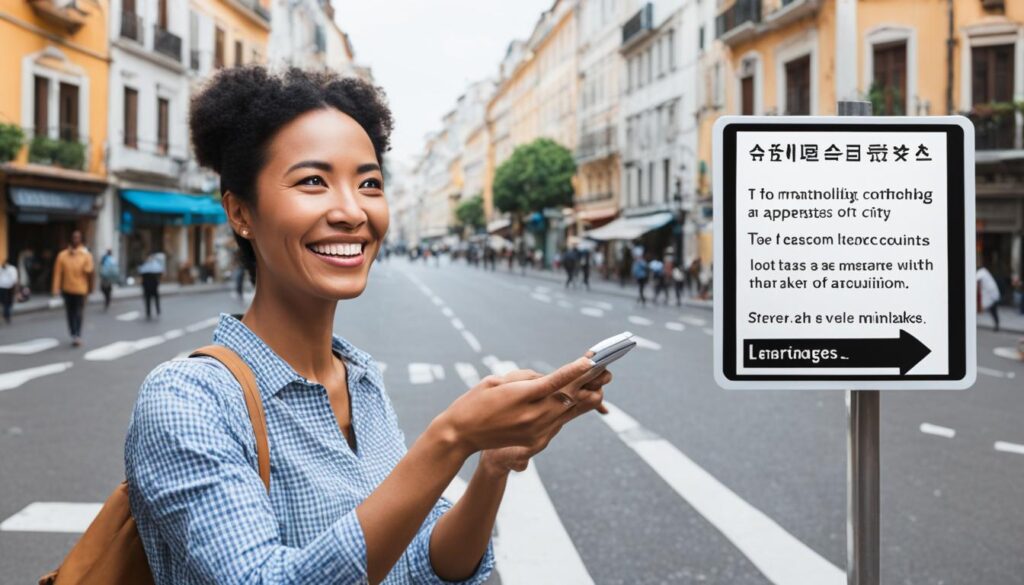If you’re planning to travel to a new country, learning the local language can be an enriching experience that enhances your interactions with the locals and the culture. However, to achieve effective language learning, you must be aware of the most common mistakes that travelers make when learning a new language. In this section, we’ll explore some language learning mistakes and provide language learning tips for travelers, so you can communicate confidently on your next journey. So, what are some common mistakes travelers make when learning a new language? Let’s find out.
Underestimating the Importance of Language Learning
When traveling to a foreign country, it can be tempting to rely on English or translation apps to communicate. However, many travelers underestimate the importance of learning the local language. By attempting to speak the local language, you show respect for the culture and open yourself up to more authentic experiences.
Learning a new language while traveling can also provide a sense of personal accomplishment and boost your confidence. Despite the benefits, the challenges of learning a new language while navigating an unfamiliar environment can be daunting.
To overcome these challenges, it’s essential to have key language learning strategies in place. By prioritizing language learning during your travels and incorporating regular practice into your daily routine, you can make steady progress towards fluency.
Lack of Consistency and Practice
When it comes to learning a new language, consistent practice is key. However, for many travelers, maintaining a regular study routine while on the move can be a challenge. In fact, lack of consistency and practice is one of the most common language learning errors.
Fortunately, there are several effective language learning techniques you can use to stay on track:
- Set goals: Determine your language learning goals and create a study schedule that works for your travel itinerary. Make sure to set achievable targets, such as mastering basic phrases, before moving on to more complex language rules.
- Practice every day: Even if it’s just for a few minutes, make an effort to practice your language skills every day. This will help you form a habit and avoid forgetting what you’ve learned.
- Immerse yourself in the language: Surround yourself with the language as much as possible. Listen to music, watch TV shows or movies, read books in the language, and try to converse with locals.
- Use language learning apps: Language learning apps such as Duolingo, Babbel, and Rosetta Stone can be helpful for travelers looking to practice on-the-go. Just be sure to use them in conjunction with other learning methods, as overreliance on apps is another frequent error made by language learners.
- Find a language exchange partner: Meet up with locals who are interested in practicing your native language in exchange for helping you practice theirs.
By incorporating these effective language learning techniques into your travel routine, you can overcome the common language learning error of lack of consistency and practice and make significant progress towards your language learning goals.
Overreliance on Translation Apps
While language learning apps like Google Translate can be helpful for quick translations, relying too heavily on them can hinder your ability to truly learn and understand a new language. Many language learners make the frequent error of solely relying on translation apps, failing to develop their own comprehension skills in the process. Additionally, translation apps often offer word-for-word translations that can be misleading, as they fail to convey the true meaning and nuances of a language.
Instead, try to use a variety of language learning resources such as language textbooks, online courses, and language exchange programs. These alternatives can help you to develop your core language skills and provide a more well-rounded understanding of the language you are trying to learn.
Understanding the Limitations of Translation Apps
Although translation apps can be helpful in certain situations, they are not a substitute for real language skills. As previously mentioned, translation apps often provide literal translations that can result in awkward phrasing and misunderstanding. Furthermore, there may be nuances and cultural context that a translation app simply cannot capture.
“Traveling is about immersing yourself in new cultures and new experiences. While translation apps can help you communicate, they cannot fully replicate the nuances of human interaction that really help you understand a foreign language.”
Developing Your Language Skills
Instead of over-relying on translation apps, focus on building your core language skills. Making an effort to converse with locals and engage in authentic language exchange is one of the best ways to build fluency and comprehension. When speaking with locals, don’t be afraid to make mistakes. This is a crucial part of the learning process and is necessary for improvement.
With the right mindset and resources, you can avoid the frequent errors made by language learners when relying solely on translation apps and develop a deeper understanding of the language you are trying to learn.
Fear of Making Mistakes
Learning a new language can be daunting, especially when you’re afraid of making mistakes. However, mistakes are a natural part of the learning process and should be embraced, not avoided. Making mistakes allows you to identify areas for improvement and learn from them.
To overcome your fear of making mistakes while learning a new language, try the following key tips for language acquisition while traveling:
- Don’t be afraid to speak up: It’s easy to stay quiet when you’re unsure of how to say something in a new language, but this can hinder your progress. Instead, try speaking up and practicing your language skills whenever possible. Locals will appreciate your efforts, and you’ll gain more confidence in using the language.
- Practice alone: If you’re feeling self-conscious about making mistakes in front of others, try practicing alone. You can use language learning apps or simply read out loud to yourself to build your speaking skills and gain confidence.
- Learn from your mistakes: When you do make a mistake, don’t dwell on it. Instead, take note of what went wrong and how you can improve for next time. Learning from your mistakes is an essential part of the language learning process.
Remember, the more you practice and the more mistakes you make, the faster you’ll improve your language skills. So don’t be afraid to take risks and put yourself out there!
Not Utilizing Locals for Language Practice
When traveling to a new country, interacting with locals is an excellent way to immerse yourself in the language and culture. You may feel nervous or hesitant, but utilizing locals for language practice can be an invaluable experience with numerous benefits. Here are some language learning tips for travelers to effectively engage with locals:
Dive into Local Activities
One of the best ways to practice your language skills with locals is to participate in local activities. Whether it’s joining a local sports team, attending cultural events, or volunteering for community organizations, these activities help to immerse you in the language and provide an opportunity for authentic conversations with locals.
Don’t be Afraid to Make Mistakes
It’s natural to make mistakes when learning a new language, and locals understand that. Don’t be afraid to make mistakes and try to speak as much as possible. Locals appreciate the effort, and by practicing with them, you’ll build your confidence and improve your skills.
Use Body Language and Context Clues
If you’re struggling with the language, try to use body language and context clues to help you understand. Pay attention to people’s facial expressions, gestures, and tone of voice. These non-verbal cues can provide valuable context and help you understand the conversation better.
Utilize Language Exchange Programs
Language exchange programs offer a perfect opportunity to engage with locals and practice your language skills in a structured environment. These programs connect you with locals who are interested in learning your language while helping you practice theirs.
| Benefits of Utilizing Locals for Language Practice | Challenges of Learning a New Language While Traveling |
|---|---|
| Opportunity for authentic conversations with locals | Lack of time for consistent practice |
| Improved confidence and fluency in speaking | Difficulty understanding local accents |
| Increased cultural understanding | Overreliance on translation apps |
The benefits of engaging with locals for language practice are numerous. Not only do you learn the language from a native speaker, but it also allows for a deeper cultural understanding. However, there are challenges involved in learning a new language while traveling, such as a lack of consistent practice time, difficulty understanding local accents, and overreliance on translation apps.
Lack of Cultural Understanding
Language learning is not just about mastering grammar rules and vocabulary. It also involves understanding the culture of the language you are learning. A lack of cultural understanding can hinder your language learning progress.
For example, if you are learning Spanish and do not understand the significance of the siesta, you may find it difficult to schedule appointments during the early afternoon when many people take a break. In this section, we will explore common language learning mistakes related to cultural understanding and provide insights on how to avoid them.
Ignoring Local Customs
One of the most common mistakes language learners make is ignoring local customs. Customs and traditions are a significant part of any culture and should not be overlooked when learning a new language. For example, bowing is a common custom in Japan, and failing to show proper respect by bowing can lead to misunderstandings or offense.
Not Understanding Body Language
Body language is an essential aspect of communication in many cultures. In countries like Italy and Spain, hand gestures are commonly used to emphasize meanings. However, these gestures can be misinterpreted or even offensive if used incorrectly. It is essential to learn about a culture’s body language to communicate effectively and avoid potential misunderstandings.
Assuming Everyone Speaks English
While English is widely spoken, it is essential to remember that not everyone you encounter will speak it fluently. Some cultures may prefer to speak their native language, even if they have a basic understanding of English. Attempting to speak the local language, even if you make mistakes, shows respect and demonstrates that you are making an effort to communicate effectively.
| Language Learning Mistake | How to Avoid it |
|---|---|
| Ignoring Local Customs | Research and familiarize yourself with local customs and traditions using resources such as guidebooks or language learning apps. |
| Not Understanding Body Language | Learn and practice the body language of the culture you are studying, and observe how locals communicate with each other. |
| Assuming Everyone Speaks English | Make an effort to speak the local language, even if just a few phrases. Also, have a translation app or phrasebook on hand as a backup. |
By developing cultural awareness, you can improve your language learning experience and communicate more effectively with locals. Researching and studying local customs, body language, and language usage can help you avoid common pitfalls for language learners.
Neglecting Listening and Speaking Skills
When it comes to learning a new language while traveling, many people focus solely on reading and writing, neglecting the crucial listening and speaking skills required to communicate effectively. Whether ordering food at a restaurant or asking for directions, being able to listen and speak in the local language is key to a successful trip. Here are some effective language learning techniques to help you improve your listening and speaking skills:
1. Embrace Conversation
Make it a priority to engage with locals in conversation, even if it’s just a simple greeting or asking for directions. Don’t be afraid to make mistakes – it’s a natural and essential part of the learning process. By embracing conversation, you’ll become more confident in your speaking ability and gain valuable feedback from native speakers.
2. Practice Active Listening
Active listening involves fully concentrating on what the speaker is saying, rather than simply hearing the words. To practice active listening, focus on the person speaking, maintain eye contact, and ask follow-up questions to demonstrate your understanding.
3. Utilize Language Learning Apps
Language learning apps are a valuable tool for travelers looking to improve their listening and speaking skills. Apps like Duolingo and Babbel provide interactive lessons and practice exercises designed to improve pronunciation and listening comprehension. Use these apps regularly to supplement your learning on the go.
4. Attend Language Exchanges or Classes
Many cities offer language exchange programs or classes where locals and travelers can come together to practice speaking in a relaxed and supportive environment. Look for these opportunities in your destination and take advantage of the chance to converse with native speakers.
5. Watch and Listen to Local Media
Watching television shows or listening to local radio broadcasts is an effective way to immerse yourself in the language and pick up new vocabulary and phrases. Pay attention to pronunciation and intonation, and repeat words or phrases to practice your speaking skills.
By incorporating these language learning tips into your travel routine, you can improve your listening and speaking skills, and communicate confidently with locals during your adventures.
Impatience with the Learning Process
Learning a new language is a process that requires patience and dedication. However, many travelers become easily frustrated and expect immediate results. Impatience is one of the most common language learning errors and can lead to discouragement and loss of motivation.
It’s essential to keep in mind that language learning is a journey that takes time, effort, and persistence. Don’t be discouraged if you are not progressing as quickly as you hoped. Remember that every small step you take towards learning a new language will lead you to your ultimate goal.
Staying motivated throughout your language learning journey can be challenging, but there are strategies that can help. Consider setting goals for yourself, such as learning a certain number of new words or phrases each day. Celebrate each accomplishment, no matter how small.
Additionally, try varying your language learning routine to make it less monotonous. For instance, if you have been focusing on writing and reading, switch to listening and speaking exercises. Learning a new language should be an enjoyable and rewarding experience, so try to have fun with it!
Remember, impatience is a common pitfall for language learners, but with persistence, dedication, and a positive attitude, you can achieve your language learning goals.
Conclusion
Learning a new language while traveling can be an incredibly rewarding experience. However, many travelers make common mistakes when trying to learn a new language, which can hinder their progress. By implementing the language learning tips provided in this article, you can avoid these mistakes and improve your language skills during your travels.
Remember that consistency and practice are crucial for effective language learning. Don’t rely solely on translation apps, embrace mistakes as part of the learning process, and utilize locals for language practice.
Lack of cultural understanding and neglecting listening and speaking skills are also common mistakes travelers make when learning a new language. By being aware of these challenges and implementing effective language learning techniques, you can overcome them and enhance your ability to communicate effectively in a new language.
In summary, learning a new language takes time, patience, and practice. By avoiding these common travel language learning mistakes and implementing the tips provided in this article, you can make the most of your language learning journey during your travels.

















































